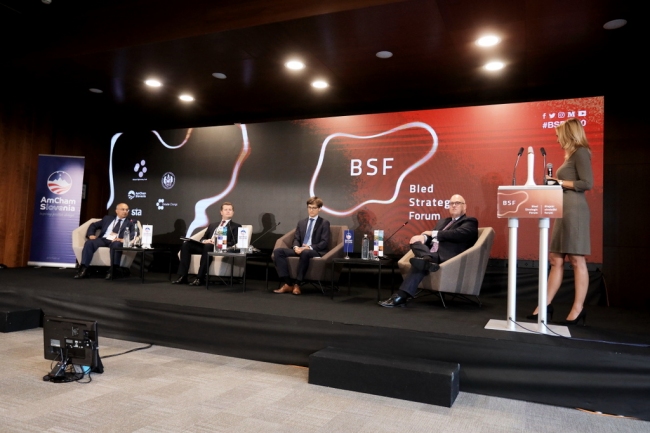Collaboration between businesses, state, civil society and academia will be key for exiting the coronacrisis, but it must be based on trust, agreed participants of the AmCham Business Breakfast held as part of the Bled Strategic Forum.
According to Igor Cesarec, vice president for global economics research, at the US investment bank and financial services corporation Citigroup, trust will be crucial. “There absolutely needs to be trust between all the different parts of the society for us to take that step forward and take cooperation and collaboration to the next level,” he said. The importance of collaboration can be seen in what the world has achieved in the last few months since the pandemic started, he believes. “When collaboration started, we were able to eliminate the first wave, we were able to make important strides towards the vaccine etc., so it’s definitely possible but trust is that glue that puts all these things together.“
One positive change that the pandemic may have brought, according to Jure Leskovec, an associate professor at Stanford University, is more trust in experts. “I think this pandemic has taught us that in times of uncertainty we need experts … to get answers.” He said that at Standford, companies were increasingly expressing interest in working with professors and investing in knowledge. “We are actively working on tools, methods for forecasting how coronavirus is going to spread,” he said, adding this was important both on the national level as well as for companies, which want to avoid closing down big factories in case of an infection. Noting the importance of good, rigorous work done by experts, Cesarec also stressed the importance of communicating it to the general public. “Without that piece of the puzzle I think the first part is less effective.”
Joe Philipsz, senior director at the Amber Fund, which acts as the exclusive investment adviser at the Three Seas Initiative Investment Fund, said two funds were a good example of cooperation between governments and regions because apart from investing into infrastructure of the region the Three Seas Initiative Fund was designed to also encourage private investment in infrastructure, to show that governments and private investors can successfully cooperate to deliver good value and new infrastructure.
Joining the debate as a digital speaker from Paris, Ulrik Vestergaard Knudsen, deputy secretary-general at the Organisation for Economic Co-operation and Development (OECD), said that the pandemic had demonstrated that cooperation was much easier than people thought. He believes globalisation is at risk in 2020, having peaked in 2009. “This corona crisis has accelerated mega trends that were already under way: geopolitical turmoil, cold war, also de-globalisation.” But one of the positive processes it has accelerated in his opinion is the digital transformation. Knudsen is worried that the crisis and the unpredictability it brings for governments and businesses will lead to protectionism, and nationalism, which in turn will harm the prospects of cooperation, which is more needed now than ever, especially in the face of the challenges in trade, climate, cyber space, geopolitical communication. But he believes there is hope at least for cooperation in the regional level. This crisis has also revealed how interdependent market, state, civil society and academia are, he stressed.
Jonathan Moore, senior bureau official of the Bureau of Oceans and International Environmental and Scientific Affairs at the United States Department of State believes governments have to trust experts and scientists but also have to trust the people. “When you look at energy security, all over Europe you see countries have taken a very scientific and professional approach to that. Slovenia is one of them. By having a very high quality nuclear power plant, Slovenia is helping to deal with environmental challenges. There are a lot of countries elsewhere in Europe who have made exclusively political rather than scientific decisions to not pursue nuclear power.“
Meanwhile, Jan Bervar, cyber security architect at Conscia Group, raised the issue of cyber crime and trust. He pointed to digital crime as a “shadow pandemic going on for a long time“. “That pandemic is getting worse combined with the coronavirus pandemic,” he warned. According to him, cyber criminals have been inventing new business models that work in the last five years. Combined with the coronavirus pandemic that has forced the world to work in a more distributed way, and collaborate more, the risks are getting worse, and this will remain the problem for a long time, he said.
On a more positive note, Igor Zgrabljić, government affairs and public policy manager at Google CEE, reporting online from Zagreb, said he believed technology would help the world get out of this crisis faster. He sees great opportunity in digital transformation for central and eastern Europe. Regional cooperation will be key, he said. “What works well in Slovenia could probably also work well in Croatia and vice versa.”
Source: STA
You can watch the whole event HERE.
You can see the photos of the event HERE.
